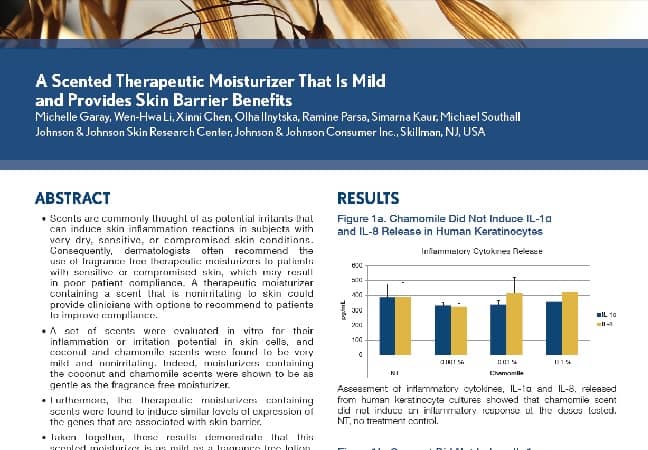Michelle Garay, Wen-Hwa Li, Xinni Chen, Olha Ilnytska, Ramine Parsa, Simarna Kaur, Michael Southall Johnson & Johnson Skin Research Center, Johnson & Johnson Consumer Inc., Skillman, NJ, USA
ABSTRACT
- Scents are commonly thought of as potential irritants that can induce skin inflammation reactions in subjects with very dry, sensitive, or compromised skin conditions. Consequently, dermatologists often recommend the use of fragrance free therapeutic moisturizers to patients with sensitive or compromised skin, which may result in poor patient compliance. A therapeutic moisturizer containing a scent that is nonirritating to skin could provide clinicians with options to recommend to patients to improve compliance.
- A set of scents were evaluated in vitro for their inflammation or irritation potential in skin cells, and coconut and chamomile scents were found to be very mild and nonirritating. Indeed, moisturizers containing the coconut and chamomile scents were shown to be as gentle as the fragrance-free moisturizer.
- Furthermore, the therapeutic moisturizers containing scents were found to induce similar levels of expression of the genes that are associated with skin barrier.
- Taken together, these results demonstrate that this scented moisturizer is as mild as a fragrance-free lotion, and additionally can similarly induce the expression of multiple barrier genes involved in skin barrier function.
OBJECTIVES
- Evaluate a set of mild scents (chamomile, coconut) for their inflammation or irritation potential using skin cells in vitro.
- Therapeutic moisturizers containing scents were further evaluated for their effect in vitro on: – the epidermal skin barrier, and – the expression of genes related to the epidermal skin barrier
STUDY DESIGN
- Human keratinocyte culture was used to evaluate the inflammatory effects of scents:
- Interleukin (IL)-1α and IL-8 by enzyme-linked immunosorbentassay (ELISA).
- Used MatTek epidermal equivalent tissues (Ashland, MA, USA) to evaluate the effects of scented lotions on the barrier integrity, gene expression, and irritation as compared with fragrance free lotion:
- The tissues were topically treated by 6 µL of lotion for 24 or 48 hours.
- Measured barrier integrity by transepidermal electrical resistance (TEER), and the inflammatory cytokines IL-1α and IL-8 by ELISA.
RESULTS
Figure 1a. Chamomile Did Not Induce IL-1α and IL-8 Release in Human Keratinocytes
8.7_figure_1.jpg
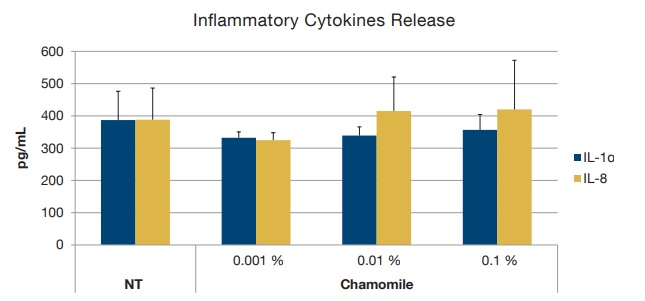
Assessment of inflammatory cytokines, IL-1α and IL-8, released from human keratinocyte cultures showed that chamomile scent did not induce an inflammatory response at the doses tested. NT, no treatment control.
Figure 1b. Coconut Did Not Induce IL-1α and IL-8 Release in Human Keratinocytes
8.7_figure_1b.jpg
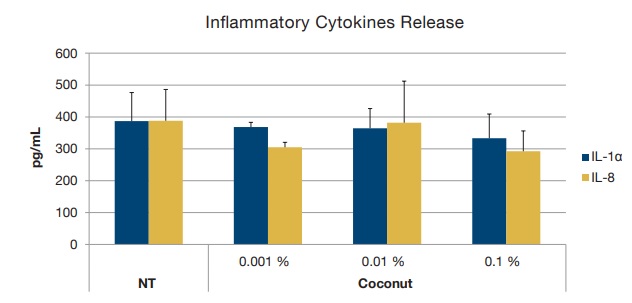
Assessment of inflammatory cytokines, IL-1α and IL-8, released from human keratinocyte cultures showed that coconut scent did not induce an inflammatory response at the doses tested. NT, no treatment control.
Figure 2a. Moisturizers Containing Scent Performed Similarly to the Fragrance-Free Moisturizer on Skin Barrier in Human Epidermal Skin Equivalents
8.7_figure_2.jpg
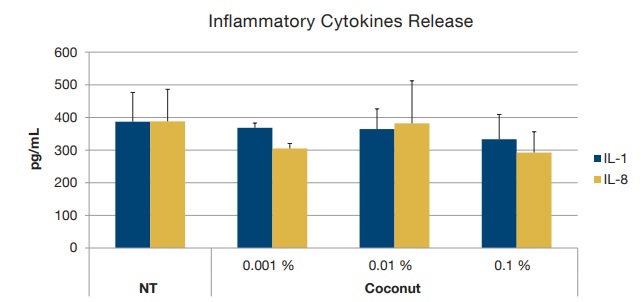
Moisturizers containing either coconut or chamomile scent caused similar TEER changes to a fragrance-free moisturizer.
Figure 2b. Moisturizers Containing Scent Performed Similarly to the Fragrance-Free Moisturizer by Not Increasing Inflammatory Mediator Release
8.7_figure_2b.jpg
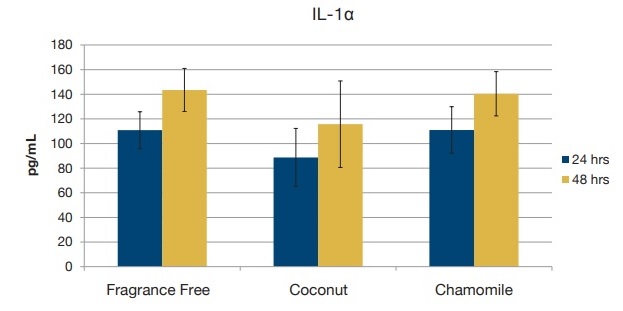
Moisturizers containing no scent, coconut scent, or chamomile scent induced similar IL-1α release from human epidermal skin equivalents after 24-or 48-hour exposure.
Figure 2c. Moisturizers Containing Scent Performed Similarly to the Fragrance-Free Moisturizer by Not Increasing Inflammatory Mediator Release
8.7_figure_2c.jpg
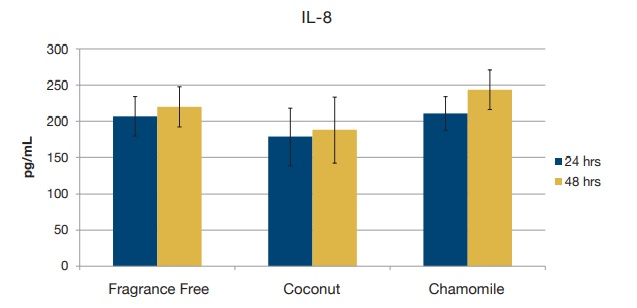
Moisturizers containing no scent, coconut scent, or chamomile scent induced similar IL-8 release as a fragrance-free moisturizer.
Figure 3. Moisturizers Containing Scent Performed Similarly to the Fragrance-Free Moisturizer on Skin Barrier Gene Expression
8.7_figure_3.jpg
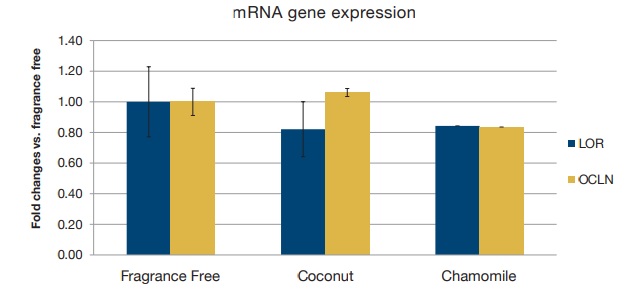
Moisturizers containing either coconut or chamomile scent induced similar levels of expression of the barrier-relevant genes loricrin (LOR) and occludin (OCLN) as a fragrance-free moisturizer in human epidermal skin equivalents.
CONCLUSIONS
- Coconut and chamomile scents were found to be very mild and nonirritating.
- Moisturizers containing the coconut and chamomile scents were shown to be as gentle as the fragrance-free moisturizer.
- Moisturizers containing scents were found to have a similar gene expression profile to the fragrance-free moisturizer for the genes related to epidermal skin barrier.
- Mild, nonirritating therapeutic moisturizers containing scents can provide clinicians with additional treatment options using scented therapeutic moisturizers, thus encouraging increased patient compliance.
DISCLOSURES
- Michelle Garay, Wen-Hwa Li, Xinni Chen, Olha Ilnytska, Ramine Parsa, Simarna Kaur, and Michael Southall are or were employees of Johnson & Johnson Consumer Inc. when these experiments were conducted.
- This study was supported by Johnson & Johnson Consumer Inc., Skillman, NJ, USA.
- Editorial assistance was provided by Alex Loeb of Evidence Scientific Solutions (Philadelphia, PA, USA), and was funded by Johnson & Johnson Consumer Inc.

